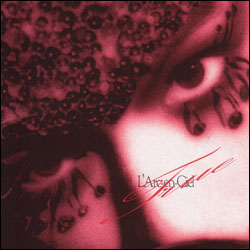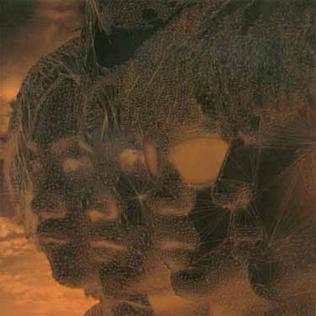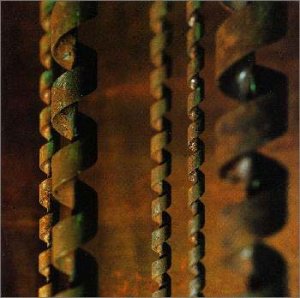
True is the fourth album by L'Arc-en-Ciel, released on December 12, 1996. It was the band's last record with sakura on drums. It reached number one on the Oricon chart and sold over a million copies, being certified by the RIAJ. It was also named one of the top albums from 1989-1998 in a 2004 issue of the music magazine Band Yarouze.

Heart is the fifth album by L'Arc-en-Ciel, released on February 25, 1998. It is the band's first album with yukihiro on drums, and marked the band's return to mainstream attention following the arrest of the former drummer sakura. It reached number one on the Oricon chart and sold over a million copies, being certified by the RIAJ.

Ark is the sixth album by L'Arc-en-Ciel, released on July 1, 1999, simultaneously with Ray. It reached number one on the Oricon chart and sold over two million copies, being certified by the RIAJ.

Ray is the seventh album by L'Arc-en-Ciel, released on July 1, 1999, simultaneously with Ark. It reached number two on the Oricon chart, behind only Ark, and sold over two million copies, being certified by the RIAJ.

Real is the eighth album by L'Arc-en-Ciel, released on August 30, 2000. It was the band's last original studio album before a prolonged hiatus. It reached number one on the Oricon chart and sold over a million copies, being certified by the RIAJ.

Valenti was released in 2003 and is BoA's highest-selling second Japanese studio album and sold over 1.2 million copies.Valenti debuted at number one on the weekly charts with over 615,000 copies in its first week. It was also number one in its second week with another 222,000 copies sold. Valenti has been certified million by the RIAJ.

The Recording Industry Association of Japan (RIAJ) is an industry trade group composed of Japanese corporations involved in the music industry. It was founded in 1942 as the Japan Phonogram Record Cultural Association, and adopted its current name in 1969.

X Singles is a compilation album released by X Japan on November 21, 1993. It collects all the singles, and their B-sides, released by the band while still named "X" and under contract with CBS/Sony. The album reached number 2 on the Oricon chart, and charted for 35 weeks. In 1994, with 427,860 copies sold, it was the 36th best-selling album of the year. It was later certified Million by the RIAJ. In 2014, Sony Music Japan released a remastered version.
Red is Nanase Aikawa's first album. It includes her first four singles. The album reached #1 on Oricon charts and sold over two million copies, as certified by the RIAJ.
The discography of Yumi Matsutoya, a Japanese singer-songwriter, consists of thirty-nine studio albums and EPs, forty-one singles, two live albums, and compilation albums. It also denotes her early four albums and seven singles that were released under her former stage name Yumi Arai.

Shine is the sixth album by Japanese rock band Luna Sea, released on July 23, 1998. It reached number one on the Oricon chart and is the band's highest selling studio album; selling over 1 million copies and being certified Million by the RIAJ. It was also named "Rock Album of the Year" at the 13th Japan Gold Disc Awards.

Greeeen is a Japanese pop rock/hip hop/breakbeat vocal group from Kōriyama in Fukushima Prefecture, comprising the all-male four members Hide, Navi, Kuni, and Soh. They made their debut with Universal Music in 2007. Their logo image is of a mouthful of teeth, and the four Es indicate the number of members. The sound production is handled by Hide's older brother JIN, a former guitarist of Pay money To my Pain. According to their website at Universal Music Japan, their catch phrase is "Rock 'n' Breakbeats with Four Microphones".
"Neo Universe/Finale" is the twentieth single by L'Arc-en-Ciel, released on January 19, 2000. It debuted at number 1 on the Oricon chart and sold over one million copies, as certified by the RIAJ. "Finale" was used as the theme song of Ring 0: Birthday. The third track is an instrumental and the fourth is a remix version of the song "Trick" from their 1999 album Ray.
Japanese female vocal/dance unit, MAX has released five studio albums, two compilations, three remix albums, and 31 singles. Three of their albums, Maximum (1996), Maximum Groove (1998), and Maximum Collection have topped the Oricon album charts. Four of their albums, including Maximum, Maximum II (1997), Maximum Groove, and Maximum Collection have been certified million selling albums by RIAJ. The group have 15 consecutive top ten singles, 16 overall. Their sixth single, "Give Me a Shake" (1997) is their best selling single and their only single to top the Oricon singles chart. Since their debut on May 10, 1995, the group has amassed sales of over 10 million albums and singles in Japan.

Maximum Groove is the third studio album by Japanese dance unit, MAX. It was released on December 2, 1998 by record label, avex trax. It is their second album to peak at the #1 position on the Oricon Weekly Album Charts and has since been certified a million seller by the Recording Industry Association of Japan. It is one of two albums by the group to chart in Oricon's 1999 Year-End album chart along with their first greatest hits compilation, Maximum Collection (1999). It charted at #27. The album was supported by their MAX Live Contact 1999 ~Sunny Holiday~ concert tour.

Godzilla: The Album is the soundtrack to the 1998 film, Godzilla. It was released on May 19, 1998 through Epic Records and mainly consists of alternative rock songs. The soundtrack was a success, peaking at No. 2 on the Billboard 200 and reaching platinum certification. The album was commercially successful in both the United States and Japan, being certified platinum by the RIAJ and RIAA in June and July 1998, respectively.

A Album is the debut album of the Japanese group KinKi Kids. It was released on July 21, 1997, on the same day as their debut single "Garasu no Shōnen". The album debuted at the top of the Oricon charts, selling 315,330 copies in its first week. It was certified Million by RIAJ and is currently the duo's second best-selling album.

B Album is the second studio album of the Japanese duo KinKi Kids. It was released on August 12, 1998 and debuted at the top of the Oricon charts, selling 524,540 copies in its first week. The album was certified Million by RIAJ.

KinKi Single Selection is the first greatest hits album by Japanese duo KinKi Kids. The album was released on May 17, 2000 and debuted at the top of the Oricon charts, selling 712,340 copies in its first week. The album eventually went on to sell over 1,200,000 copies by the end of the year and was certified Million by RIAJ.

Singles is the first compilation album, released by the Japanese rock band Luna Sea on December 17, 1997. It is a double album that collects all of their singles up to that point, with the A-sides on disc one, and the B-sides on the second.
















